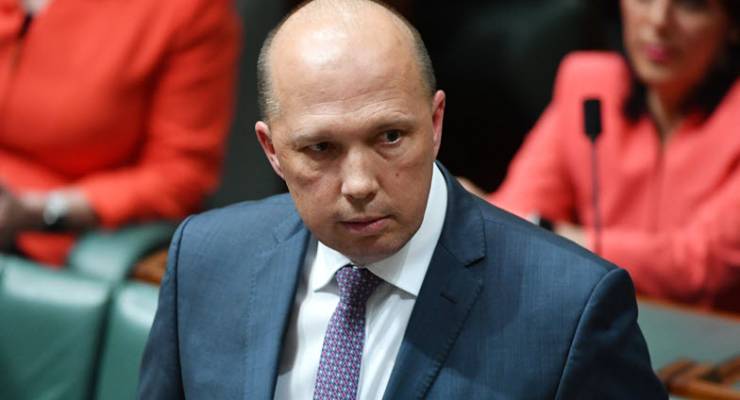
Since forming in 2014, Australian Border Force has had a mixed relationship with transparency. So it was a surprise to see, on the front page today’s Australian such a admirable commitment to press freedom from the department, with multiple sources “confirming” that New Zealand’s offer to take 150 refugees has increased talk of and attempts at people smuggling in the area. Coincidentally, this is just what Prime Minister Malcolm Turnbull said would happen last year.
Let’s look at the department’s up and down history with press freedom.
January 2014: visa costs to Nauru skyrocket
In January 2014 the Nauru government increased the costs for visiting journalists from $200 to $8,000.
Greens Senator Sarah Hanson-Young said at the time the move was designed to make it difficult for the media to access Nauru. “This is of course part of Tony Abbott’s strategy of shutting down public information about how Australian taxpayer money is being spent on the cruel and harsh detention camps on Nauru,” she said.
The government dismissed the claim, saying it was a matter for the Nauran government and when asked whether the Australian government requested the change, a spokesperson for Nauru said: “I haven’t been told anything to suggest that.”
February 2014: death of Reza Barati and its aftermath
A riot on Manus Island resulted in the death of 23-year-old Iranian asylum seeker Reza Barati (as well as 70 others being injured). Fairfax’s Rory Callinan and Nick Moir were sent to the island to cover the aftermath and, according to Callinan “qithin hours of arriving, staff from G4S, the private security company employed by the Australian government to manage the centre, had manhandled Nick, confiscated his camera and forced him to delete photographs in order to censor news”.
A G4S security guard (along with a former Salvation Army worker) would later be found guilty of murdering Barati.
January 2015: journalists referred to the AFP
The Guardian reports that journalists covering asylum seeker policies — from outlets as diverse as Guardian, news.com.au and The West Australian — are routinely referred to the Australian Federal Police in an attempt to reveal sources.
May 2015: official secrets
In May 2015, the Australian Border Force Act comes into effect. The Act makes it a criminal offence — punishable by imprisonment of up to two years — for any person working directly or indirectly for the Department of Immigration and Border Protection to disclose to the media (or any other person or organisation) anything that happens in detention centres. It requires that contractors engaged by the department to take an unspecified oath, and allows the government to define contractors as “Immigration and Border Protection” workers for the purpose of the Act. Thus allowing contractors the best of both worlds — to both be subject to strict whistleblower restrictions under the act, AND be freer from the scrutiny of Freedom of Information legislation, Senate estimates appearances and public sector codes of conduct, than an actual Border Force employee would be.
September 2015: United Nations postpones trip
François Crépeau, the United Nations special rapporteur on the human rights of migrants, postpones his trip to Australia, saying the legislation covering detention centre workers would render his visit pointless:
“In preparing for my visit, it came to my attention that the 2015 Border Force Act, which sanctions detention centre service providers who disclose ‘protected information’ with a two-year court sentence, would have an impact on my visit as it serves to discourage people from fully disclosing information relevant to my mandate. This threat of reprisals with persons who would want to cooperate with me on the occasion of this official visit is unacceptable.”
April 2017: Dutton demands apology
Following a disturbance on Manus, where an armed mob attempted to storm the compound and fired a gun into the centre, Immigration Minister Peter Dutton demands an apology from Fairfax and the ABC for their reporting of the matter, in particular their reliance on Papua New Guinean politician Ronny Knight. His department is oddly laid back however when Andrew Bolt claims to have seen CCTV footage which backs the minister’s account up, saying they were not investigating the leak.
June 2017: the government settles out of court
The government, faced with a class action suit on behalf on 1,905 detainees on Manus island, agrees to pay out $70 million dollars (plus $20 million in legal fees) — the largest human rights class action settlement in Australian history. The move, avoiding a long court case and the discovery process associated, is described in our sister publication The Mandarin as a “blow to transparency and accountability”:
Reading through the accounts of murder, attempted suicide, sexual assault, child abuse and lack of access to medical treatment at the Manus Island detention centre, it’s little wonder the government chose to settle the class action against it out of court and compensate 1,905 asylum seekers and refugees held at the facility.








People such as teachers have defied the anti-democratic ministers who seek to hide the truth of our off shore hell holes, and because some of the Press is still free they have not been fined or imprisoned. So we must thank these brave souls for not being intimidated. In Turkey, Russia or Iran they would be in grave danger. Yet even in those countries people speak up, with none but Amnesty to defend them.
Both the Minister and his ministerial mentor before; will be written into our national history. Neither one or the other will lose a wink of sleep. For both have ably shown their contempt for those placed under their care or; and for the erosion of parliamentary accountabilities, national and international humane protocols.
Evenso, the historical record will stand. As will the inclusive future contempt of the Australian people in their judgement of the persons responsible for the inhumanities carried out on Nauru and Manus Island under our name.